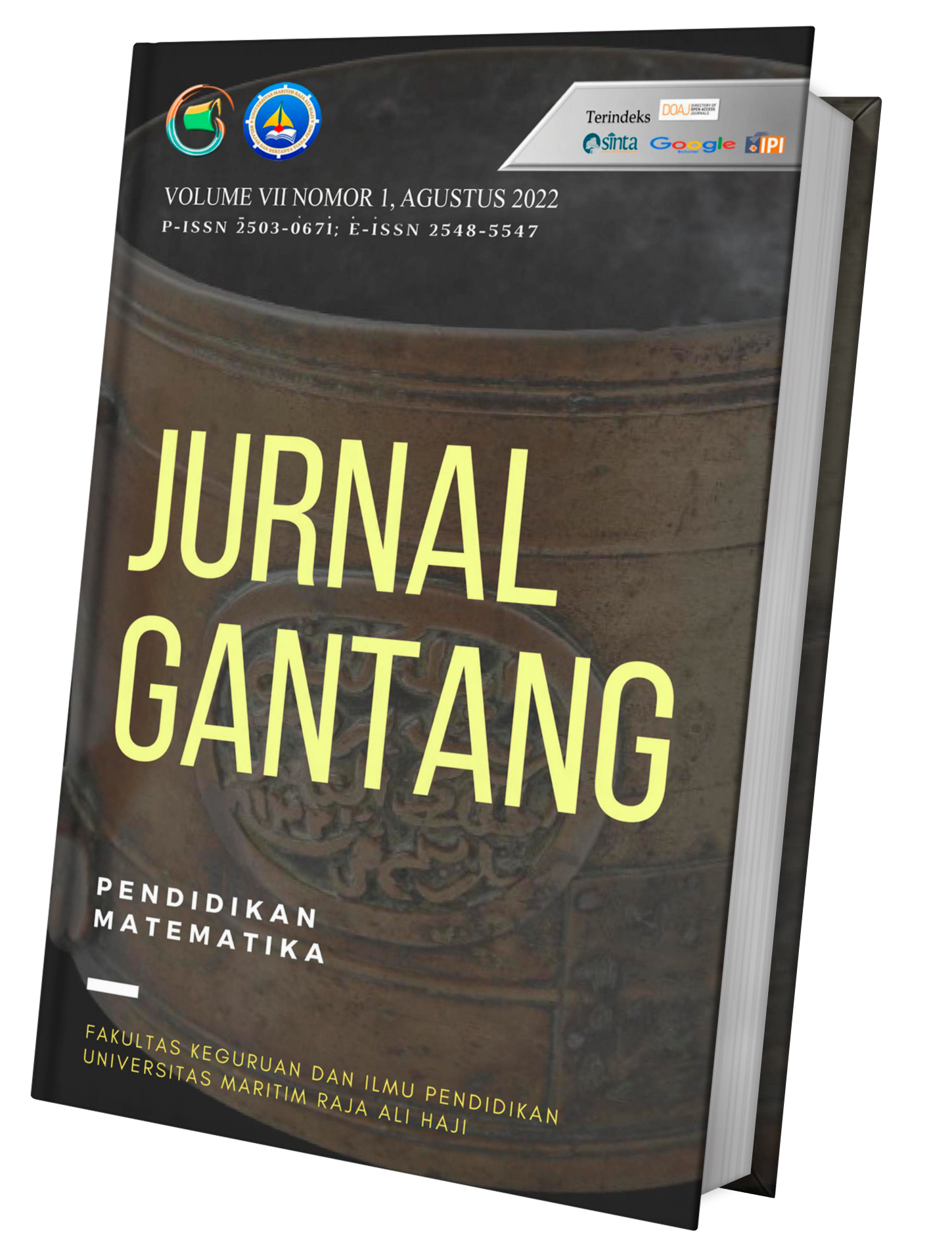The Development of Learning Device Based on Cognitive Conflict to Improve Mathematics Problem Solving Skills for Students in Madrasah Tsanawiyah
DOI:
https://doi.org/10.31629/jg.v7i1.4416Keywords:
math learning devices, cognitive conflict-based learning, mathematical problem-solving skillsAbstract
According to the National Council of Mathematics Teachers (NCTM) 2005, Mathematics is a means of problem-solving. NCTM also emphasizes that problem solving cannot be separated from learning Mathematics because problem-solving is an integral part of learning Mathematics. This study aims to improve the mathematical problem-solving ability of students in the Madrasah Tsanawiyah by using a cognitive conflict-based learning model. The subjects of this study were students of class VII Madrasah Tsanawiyah. This type of research is development research. Data collection was carried out in 3 stages, the investigation stage, the prototype phase, and the assessment phase as the level of implementation and achievement in using the cognitive conflict-based learning model. The instruments used in this study were in the form of interview guidelines, questionnaires, and observation sheets. The data analysis carried out is the analysis of data on the validity, practicality, and effectiveness of learning tools. The results of problem-solving abilities can be seen from the results of students' final tests in each meeting which always increase. Based on the study's results, it can be concluded that Cognitive Conflict-based mathematics learning tools can improve students' mathematical problem-solving abilities.
Downloads
References
Afriansyah, E. A. (2013). Design research: Place value in decimal numbers using metric system. In International Seminar on Mathematics, Science, and Computer Science Education MSCEIS, Universitas Pendidikan Indonesia (UPI) Bandung.
Agustami. dkk. (2021). Analisis kemampuan pemecahan masalah matematis siswa dalam menyelesaikan soal materi lingkaran. JPMM: Jurnal Prodi Pendidikan Matematika IKIP PGRI Pontianak. Retrieved from https://jurnal.mipatek.ikippgriptk.ac.id/index.php/JPPM/ article/view/279
Amam, Asep. (2017). Penilaian kemampuan pemecahan masalah matematis siswa SMP. Jurnal Teorema: Teori dan Riset Matematika Universitas Galuh. Retrieved from https://jurnal.unigal.ac.id/index. php/teorema/article/ view/765
Cahyani, H. dan R. W. S. (2017). Pentingnya peningkatan kemampuan pemecahan masalah melalui PBL untuk mempersiapkan generasi unggul menghadapi MEA. Prosiding Seminar Nasional Matematika X 2016. https://journal.unnes.ac.id/sju/index.php/prisma/article/view/21635
Devina, P. S. elfis; K. (2021). Pengembangan perangkat pembelajaran berorientasi berpikir tingkat tinggi model problem based learning materi peluang kelas VIII SMP. Jurnal Gantang, 6(1). https://doi.org/10.31629/jg.v6i1.2867
Diyastanti, A. (2018). Meningkatkan kemampuan pemecahan masalah dan self- esteem matematis siswa kelas VII dengan model eliciting activitiy. (Skripsi). Universitas Negeri Semarang.
Fatimah, Ade Evi. (2016). Peningkatan kemampuan pemecahan masalah matematis dan kemandirian belajar siswa SMK negeri 1 Percut Sei Tuan melalui pendekatan differentiated instruction. MES: Journal of Mathermatics Education and Science UISU Medan. Retrieved from https://jurnal.uisu.ac.id/index. php/mesuisu/article/view/111
Fauzan dan Tasman. (2012). Laporan penelitian: analisis literasi matematis siswa SMP di Sumbar. Laporan Pernelitian. UNP
Fauzi Amin.(2011). Peningkatan kemampuan koneksi matematis dan kemandirian belajar siswa dengan pendekatan pembelajaran metakognitif di sekolah menengah pertama. Disertasi pada PPs UPI Bandung: Tidak diterbitkan.
Gusnidar. (2017). Implementasi strategi pembelajaran konflik kognitif berbantuan software wingeom dalam meningkatkan kemampuan pemecahan masalah matematis. Jurnal Edukasi Matematika Dan Sains, 5(2). Retrieved from http://e-journal.unipma.ac.id/index.php/JEMS/article/view/1988
Hendriana, H, and U Soemarmo. (2014). Penilaian pembelajaran matematika. Bandung: Refika Aditama
Hidayat, Wahyu dan Ratna Sariningsih. (2018) Kemampuan pemecahan masalah matematis dan adversity quotient siswa smp melalui pembelajaran open ended. JNPM: Jurnal Nasional Pendidikan Matematika Universitas Gunung Jati. Retrieved from https://jurnal.ugj.ac.id/index.php/JNPM/article/view/1027/0
Jackson Pasini Mailing. (2017). Thinking process of naive problem solvers to solve mathematical problems. International Education Studies, 10(1). https://doi.org/10.5539/ies.v10n1p1
Latifah, Teli dkk. (2021). Kesulitan dalam kemampuan pemecahan masalah matematis siswa pada materi statistika. JARME: Journal of Authentic Research on Mathematics Education. Retrieved from https://jurnal.unsil.ac.id/index.php/jarme/ article/view/3207
Lathifah, Hanum Faizunnur. dkk.. (2021). Analisis faktor yang mempengaruhi kemampuan pemecahan masalah matematis siswa SD PRIMARY: Jurnal Pendidikan Guru Sekolah Dasar UNRI. Retrieved from https://primary.ejournal.unri.ac.id/index.php/JPFKIP/article/view/ 8105
Lestari, K. E. dan Yudhanegara, M. R. (2015). Penelitian pendidikan matematika. Bandung: Refika Aditama.
Mairing, J. P. (2017). Thinking process of naive problem solvers to solve mathematical problems. International Education Studies, 10(1).
Meika, Ika. dkk. (2021). Kemampuan pemecahan masalah matematis siswa dengan menggunakan model pembelajaran SSCS. Jurnal Cendekia: Jurnal Pendidikan Matematika. Retrieved from https://j-cup.org/index.php/cendekia/article/view/388
Mudlofir, A. (2016). Desain Pembelajaran Inovatif. Jakarta: PT Raja Grafindo Persada
Nasution, Haryati Ahda (2013). Perbedaan peningkatan kemampuan pemecahan masalah dan komunikasi matematik siswa pada pembelajaran berbasis masalah dan pembelajaran langsung pada siswa SMP [Universitas Negeri Medan]. Retrieved from http://digilib.unimed.ac.id/4085/1/1. 8116171007 Judul.pdf
Nengsih, Luluk Wahyu. dkk. Tahun 2019 melakukan penelitian berjudul kemampuan pemecahan masalah matematika siswa sekolah dasar dengan gaya kognitif field dependent. Jurnal Pendidikan: Teori, Penelitian dan Pengembangan Universitas Malang. Retrieved from http://journal.um.ac.id/index.php/jptpp/article/view/11927/5664
Permendiknas No. 22 Tahun 2006 tentang standar isi untuk satuan pendidikan dasar dan menengah. 2006. Jakarta: Depdiknas
Plomp, Tjeerd & Ninke Nieveen. (n.d.). Educational Design Research. Netherlands Institute For Curriculum Development (SLO).
Putra, Harry Dwi. dkk. (2018). Kemampuan pemecahan masalah matematis siswa SMP pada materi bangun ruang. JIPM: Jurnal Ilmiah Pendidikan Matematika. Retrieved from http://e-journal.unipma.ac.id/index.php/jipm/article/view/2007/0
Rahmani, Wirda dan Nurbaiti Widyasari. (2018). Meningkatkan kemampuan pemecahan masalah matematis siswa melalui media tangram. FIBONACCI: Jurnal Pendidikan Matematika dan Matematika. Retrieved from https://jurnal.umj.ac.id/index.php/fbc/article/view/2402
Rima, E. 2016. Ragam media pembelajaran. Jakarta: Kata Pena.
Rokhima, N. dan H. F. (2017). Pemecahan masalah matematika siswa smp ditinjau dari kecerdasan intrapersonal. Seminar Nasional Pendidikan, Sains Dan Teknologi Fakultas Matematika Dan Ilmu Pengetahuan Alam Universitas Muhammadiyah Semarang. Retrieved from https://jurnal.unimus.ac.id/index. php/psn12012010/article/view/3068
Setiana, Dafid Slamet. (2021). Analisis efektivitas e-students worksheet (lembar kegiatan peserta didik elektronik) berbasis etnomatematika Batu Akik ditinjau dari kemampuan awal siswa. Jurnal Gantang, 6(2). https://doi.org/10.31629/jg.v6i2.3566
Slameto. 2010. Belajar dan faktor-faktor yang mempengaruhinya. Jakarta: Rineka Cipta
Sumarmo, U. (n.d.). 2012. Pendidikan karakter Serta Pengembangan Berfikir dan Disposisi Matematik Dalam Pembelajaran Matematika.


















